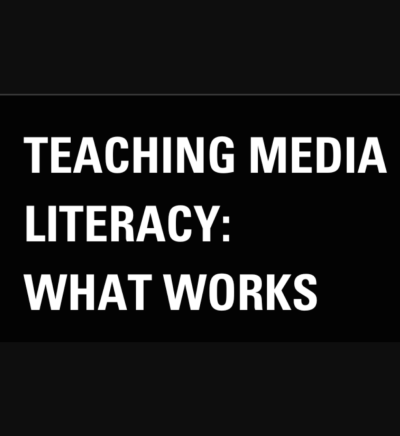Teaching Media Literacy: What Works
 Tuesday, June 4, 2024 | 3:30pm - 5:00pm
Tuesday, June 4, 2024 | 3:30pm - 5:00pm
Sponsored by the Museum of Tolerance, Los Angeles
Join Dr. Renee Hobbs, national leader in media and digital literacy education, to explore the latest research and discover best practices in integrating media literacy into instruction. Help students decode propaganda, use the power of fair use for digital learning, and cultivate a discerning mind as they create media. Renee's work has inspired countless educators, parents, and students worldwide to embrace the practice of media literacy education as a means to transform schools and society. Get ready to help students take control of their media consumption and become savvy users and creators.
All participants who attend the Zoom will receive a free copy of Renee's latest book: Mind Over Media: Propaganda Education for a Digital Age.
The Museum of Tolerance (MOT) is the educational arm of the Simon Wiesenthal Center, an internationally renowned Jewish human rights organization. The only museum of its kind in the world, the MOT is dedicated to challenging visitors to understand the Holocaust in both historic and contemporary contexts and confront all forms of prejudice and discrimination in our world today. Established in 1993, the MOT has welcomed over seven million visitors. Visitors become witnesses to history and explore the dynamics of bigotry and discrimination that are still embedded in society today. Through interactive exhibits, special events, and customized programs for youths and adults, the Museum engages visitors’ hearts and minds, while challenging them to assume personal responsibility for positive change.
RESOURCES FOR THIS SESSION
Make a Copy of the PD Slide Deck
Read the Position Paper: Media Education in English Language Arts
National Council of Teachers of English (2023)
https://ncte.org/statement/media_education/
Set Your Motivation
Review the 12 Teacher Motivations for Media Literacy and take the quiz!
https://setyourmotivation.com/
Media Literacy Smartphone Cards
The Media Education Lab offers Media Literacy Smartphones to structure students media analysis skills. https://mediaeducationlab.com/media-literacy-smartphone
Contemporary Propaganda Gallery
Anyone can upload examples to the Gallery and share their interpretations https://propaganda.mediaeducationlab.com
Mind Over Media Propaganda Education Curriculum
Nine lessons for high school and college students
https://propaganda.mediaeducationlab.com/teachers
Courageous Conversations
Nine lesson plans for exploring how media literacy and active listening can reduce the fear and hate that leads to violence.
https://www.courageousri.com/topics
Read the Research Referenced in this PD Program
Hobbs, R. (2010). Digital and Media Literacy: A Plan of Action. A White Paper on the Digital and Media Literacy Recommendations of the Knight Commission on the Information Needs of Communities in a Democracy. Aspen Institute. Washington, D.C.
Hobbs, R. (2013). Improvization and strategic risk-taking in informal learning with digital media literacy. Learning, Media and Technology, 38(2), 182-197.
Hobbs, R., & Tuzel, S. (2017). Teacher motivations for digital and media literacy: An examination of Turkish educators. British Journal of Educational Technology, 48(1), 7-22.
Hobbs, R. (2020). Mind over media: Propaganda education for a digital age. WW Norton & Company.
Also check out the companion website for Renee's book which offers many online resources
Hobbs, R. (2023). The importance of media literacy in a culture of extremist violence. Media Development, 69(3).